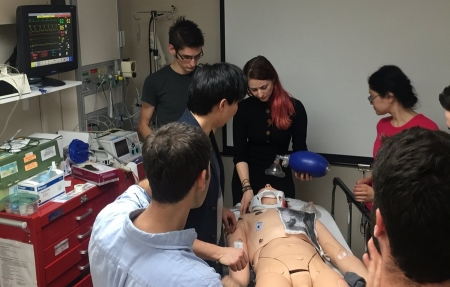Simulation Education Specialty Track
Faculty Director: Ketan Patel, MD

This track is made for EM residents with an interest in learning and developing the skills to purse a career in Simulation Education. It is designed to give residents an understanding of this field and the basic skills to pursue a fellowship after residency. The track constantly being improved to provide the best experience possible at TBHC.
Below is a continuous specialty track option with two-week blocks. See below for four-week elective option.
LEARNING OBJECTIVES
- To understand the role of simulation education in the medical field
- To be exposed to the various ways simulation can be utilized including resident and medical student education, quality improvement, inter-professional development, communication, community outreach, and faculty development
- To learn the basic principles of education theory including Andragogy and Master of Learning
- To be exposed to the fundamental concepts and skills of effective debriefing
- To write cases and develop specific learning goals for each
- To run a simulation session for varying learners including students, residents and faculty
- To perform in-situ simulation in the hospital i.e. emergency department
- To read the literature and current publications in simulation education
- To become familiar with the technology including software, manikins, and mobile programs
- To independently be able to set up and run a simulation session for a group of learners
- Strengthen the qualifications and skills necessary to succeed in fellowship
RECURRENT ANNUAL OBJECTIVES
Semi-annual meeting with your preceptor includes:
- Discussing basic fundamental principles in education via landmark articles
- Reviewing recent advances in simulation literature
- Lead resident conference and medical student orientation simulation session
- Discussion of current and future projects at TBHC
- Work on TBHC Simulation Handbook
- Going over fellowship and career opportunities
- Discuss for national leadership roles and conferences in simulation
SIMULATION JOURNAL CLUB
There is a wide breath of landmark literature on the role of simulation in the medical field and education theory. You will choose one of these landmark articles that your preceptor provides and discuss its relevance to the field and its application to current practice. You will also choose a recent article of your own published in the simulation literature and discuss how the field is advancing and future projects that may be of interest to you.
SIMULATION PROJECT
After initial exposure to the field you should begin to develop a project that interests you continue throughout your specialty track. After synthesizing an idea you will discuss it with your faculty member and identify your goals prior to graduation. You can continue an ongoing project or start your own that has not been explored yet. Ongoing projects include:
- Formalizing residency conference simulation curriculum
- In-situ simulation with residents during clinical hours, i.e., morning report
Other potential projects include:
- Developing medical student orientation day and rotation curriculum
- In-situ simulation with inter-professional staff: Nurses, techs, respiratory therapists, secretaries)
- Inter-professional simulation with other departments: Surgery, ob/gyn, medicine, critical care, etc.
- Faculty development including teaching how to teach and revising skills
- Structured debriefing post resuscitation during clinical duties
- Standardized procedure protocol development: Conscious sedation, airway, central line, sterile techniques
- Inter-professional communication and leadership: Role assignment, closed loop communication
- Communication with patients: Delivering bad news and the difficult patient
- Acquiring new technology in simulation
- Assessment of physician competency and skills
PUBLISH
In addition to original research, which is strongly encouraged, other contributions may
- Simulation section on TBHC website
- Submitting simulation cases to national databases: CORD
- Presenting at regional and national meetings
MEETINGS AND WORKSHOPS
There are opportunities to attend simulation events at a regional and national level. You are encouraged to not only attend these events, but to be an active participant and present.
Society for Simulation in Healthcare — IMSH Meeting — Annual Conference
ELECTIVE — FOUR-WEEK OPTION
There is a simulation education elective option where you can spend one month getting exposure and experience in this field. The goals and objectives are similar to the specialty track but instead with a focus on one particular area of interest. Requirements are:
- Choose one landmark simulation article and one education article and discuss them with the preceptor
- Choose a recent simulation education article and present it as a journal club or presentation at resident conference
- Organize one simulation session for resident conference
- Organize one simulation session for medical student
- Submit two original cases with clear learning objectives to the TBHC Simulation Case File
EVALUATION
Your specialty track or one month elective will be evaluated by your preceptor based on effort put into simulation education literature via discussion with preceptor, quality of articles presentation at conference, organization and quality of resident conference and medical student simulation session and quality of two cases and learning objectives.
IMPORTANT FELLOWSHIP APPLICATION DATES
Please visit SAEM Fellowship Directory to see the available Simulation Education Fellowships. There are other simulation fellowships available as well that are not posted on the website so if there is a program you are interested in, please contact them directly early about their application process. As Simulation Education is a non-ACGME accredited fellowship, there is no match. It is important that once you have decided you want to purse a fellowship in simulation that you start your application as soon as your fourth year starts. Most programs require a CV, Letter of Interest, and 2-3 Letters of Recommendations. As the letters of recommendations take time to write and send, please ask your preceptor early to prepare it. Ideally, you want to apply early as most programs are on a rolling admission basis and once the position is taken, they will no longer interview. Please send your applications in early August and no later than September of your fourth year.